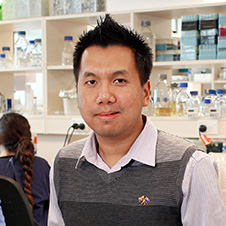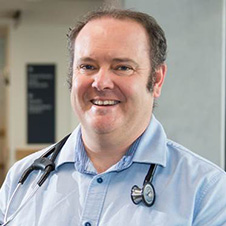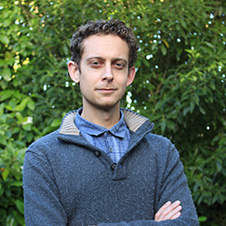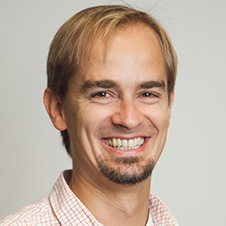 Tuesday 31 October 2017 11:53am
Tuesday 31 October 2017 11:53amFour up–and–coming University of Otago researchers have each been awarded around $500,000 from the Health Research Council (HRC) to pursue world-class projects aimed at improving New Zealander's health and wellbeing and contributing to international progress in these areas.
The four receive prestigious Sir Charles Hercus Health Research Fellowships. Their projects range from fighting multiple-drug resistant strains of tuberculosis, through to using “big data” to improve heart failure treatment outcomes, to unravelling the role that a little-studied hormone may play in ovaries in causing infertility, to enhancing the use of non-surgical treatment for musculoskeletal disorders.
They are among a total of 17 Otago health researchers and students to receive the latest funding through the HRC career development awards for 2018. A full list appears below along with summaries further down.
Sir Charles Hercus Health Research Fellowships
Dr Htin Lin Aung (Microbiology and Immunology)
Combatting tuberculosis at local and international frontlines
48 months, $500,000
Dr Hamish Jamieson (Medicine, University of Otago, Christchurch)
Big data – Creating new insights into heart failure
48 months, $500,000
Dr Michael Pankhurst (Anatomy)
Bi-modal anti-Müllerian hormone signalling in the ovary
48 months, $500,000
Dr Daniel Ribeiro (Physiotherapy)
Process evaluation of trials: maximising the potential for implementation
48 months, $498,919
Clinical Research Training Fellowship
Dr Sharon Leitch (General Practice, Dunedin School of Medicine)
Improving patient safety in New Zealand general practice
36 months, $320,000
Dr Gemma Poke (Paediatrics, University of Otago, Wellington)
Genetic characterisation of the epileptic encephalopathies
36 months, $320,000
Māori Health Research PhD Scholarship
Mr Howard Maxwell (Microbiology and Immunology)
Does inhibition of quorum sensing increase antibiotic resistance spread?
36 months, $129,900
Māori Health Research Summer Studentships
All for 3 months, and worth $5,000
Mr Tobias Hoeta (School of Physiotherapy)
Evidence for pain assessment tools sensitive for Māori – a systematic review
10 weeks, $5,000
Ms Tiana Mihaere (Preventive and Social Medicine)
Ethnic discrimination prevalence and health associations in NZ youth
10 weeks, $5,000
Mr Jordan Tewhaiti-Smith (Public Health, University of Otago, Wellington)
Maximising Māori participation for measuring unmet need in secondary healthcare
10 weeks, $5,000
Pacific Health Research PhD Scholarship
Mr Troy Ruhe (Physical Education, Sport and Exercise Science)
The effectiveness of circuit based exercise in Cook Islands communities
36 months, $133,550
Pacific Health Research Summer Studentships
All for 3 months, and worth $5,000
Ms Louise Jansen (School of Physiotherapy)
Acceptability of the treadmill six-minute walk test in Pacific peoples
Mr David Nair (Surgery, University of Otago, Christchurch)
Development of a 3D printed thoracoscopic oesophageal atresia simulator
Ms 'Eseta Vaipuna (Public Health, University of Otago, Wellington)
The home environment of Tongan children
Mr Tevita Vaipuna (Public Health, University of Otago, Wellington)
Tongan children's nutrition – native vs New Zealand migrants
Ms Sophia Dean (Public Health, University of Otago, Wellington)
Tongan children's physical activity – native vs New Zealand migrants
Miss Theresa Fitzpatrick (Physiology)
Heart samples collected by Heart Otago – the link to Pacific populations
Project summaries:
Sir Charles Hercus Health Research Fellowships
Dr Htin Lin Aung (Microbiology and Immunology)
Combatting tuberculosis at local and international frontlines
48 months, $500,000

Dr Htin Lin Aung. Photo: supplied.
Tuberculosis (TB) is a curable disease caused mainly by the bacterium Mycobacterium tuberculosis, and yet paradoxically it claims over 1.5 million lives annually. Of growing concern is the prevalence of drug-resistant TB (DR-TB) worldwide. In New Zealand, TB cases born outside NZ account for 78% of total cases, which have a significant effect on Maori and Pacific people (highest rates of TB cases in individuals born in NZ). Given the increased frequency of air travel and immigration from countries determined by the World Health Organization (WHO) as high risk for TB and DR-TB, NZ cannot be complacent. Tackling TB at international frontlines is therefore NZ's key to control and eliminate TB. Employing next-generation sequencing technology as a molecular weapon, this proposed study aims to understand the transmission of TB and DR-TB, which will lead to the development of rapid molecular diagnostic tools for reducing the emergence and spread of DR-TB.
Dr Hamish Jamieson (Medicine, University of Otago, Christchurch)
Big data – Creating new insights into heart failure
48 months, $500,000

Dr Hamish Jamieson. Photo: supplied.
This ground-breaking study will link existing New Zealand health data from multiple sources to develop an improved statistical model to predict outcomes for older people with heart failure. Heart failure is the most common cause of hospital admission in older adults and has a five year mortality of 50%. Multiple studies have shown that outcomes for patients with heart failure are difficult to predict, particularly older people who frequently have multiple comorbidities. This study will use cutting edge statistical methods to mine the world leading datasets that NZ is currently collecting on older people, to make a significant difference to people's health status. The improved risk model for outcomes in older people with heart failure will provide information that will be used directly to better target of health services and improve patient care as well as growing understanding of the causative factors resulting in poor outcomes.
Dr Michael Pankhurst (Anatomy)
Bi-modal anti-Müllerian hormone signalling in the ovary
48 months, $500,000

Dr Michael Pankhurst. Photo: supplied.
Anti-Müllerian hormone (AMH) is an ovarian regulator of egg development and appears to contribute to conditions of infertility. Most of the AMH secreted in the ovary is inactive but my research has shown the majority is activated by the time it reaches circulation. This project will determine if extracellular activation of AMH is the key mechanism that enables it to signal at two distinct locations in the ovary. The active and inactive forms will be specifically quantified at multiple sites in the human ovary using microdialysis. Fluorescent biomarkers and multiphoton live-imaging will reveal the anatomical location(s) of the AMH-activating enzymes. Electron-microscopy will determine how the protein structure of AMH defines its bioactivity. Dysregulation of AMH affects fertility but its precise role in the ovary remains unclear. Elucidating the relevant signalling mechanisms will reveal potential therapeutic targets providing a platform for a career in translational fertility research and reproductive endocrinology.
Dr Daniel Ribeiro (Physiotherapy)
Process evaluation of trials: maximising the potential for implementation
48 months, $498,919

Dr Daniel Ribeiro. Photo: supplied.
Musculoskeletal disorders are the second largest cause of disability worldwide. In New Zealand, the burden of musculoskeletal disorders is very high. Process evaluation studies identify and inform: the reasons and mechanisms through which non-surgical interventions work, on whom these interventions work, and how interventions can be modified, effectively implemented and successfully translated into clinical practice. This vital information can be used by stakeholders (e.g. Ministry of Health, District Health Board, clinicians and researchers) to improve treatment of patients with musculoskeletal disorders. Process evaluation studies maximize the implementation of findings from trials to clinical practice. Findings from this project will contribute to enhancing healthcare services in New Zealand.
Clinical Research Training Fellowship
Dr Sharon Leitch (General Practice, Dunedin School of Medicine)
Improving patient safety in New Zealand general practice
36 months, $320,000
Over 90 per cent of New Zealand healthcare interactions occur in primary care, but 16 per cent of patients are harmed by the care they receive. Patient harms cost everyone; patients, their whānau, workplaces and the health system. We propose to develop and trial a New Zealand General Practice Trigger Tool (NZGPTT), to alert clinicians when patients are at increased risk of harm, based on their age, sex, ethnicity, social deprivation level, pre-existing medical conditions, medications and type of practice providing their care. It will operate in real-time, embedded within the patient management system. The NZGPTT will be a clinician decision-support tool and patient communication aide which empowers shared decision-making by comparing treatment risks and benefits. It will be designed to try and achieve equitable health outcomes by identifying those at greatest risk of harm. By promoting patient health literacy and reducing harm, the NZGPTT can help improve the health of all New Zealanders.
Dr Gemma Poke (Paediatrics, University of Otago, Wellington)
Genetic characterisation of the epileptic encephalopathies
36 months, $320,000
The epileptic encephalopathies (EE) are a devastating group of epilepsies where frequent seizures result in neurological damage. Although international studies show 1 in 2000 infants develop EE by 18 months, there is little known about the number of children that develop these severe epilepsies after that age and no New Zealand data. The EEs are considered to be genetic disorders, however the causative gene is unknown in half of affected children. Genetic diagnosis is important as it leads to personalised care, accurate genetic counselling, and in some cases emerging therapeutic options. This study aims to discover how many children develop EE prior to their 16th birthday, and the cause of their epilepsy. The study will also identify a genetic cause for children who do not have a genetic diagnosis by using genetic strategies to consolidate known and suspected EE genes as well as make new genetic discoveries.
Māori Health Research PhD Scholarship
Mr Howard Maxwell (Microbiology and Immunology)
Does inhibition of quorum sensing increase antibiotic resistance spread?
36 months, $129,900
Infectious disease is a re-emerging global challenge with a disproportionate burden in Māori compared to non-Māori. Furthermore, this problem is exacerbated by an increase in antimicrobial resistance and limited discovery of new antibiotics. Bacteria can communicate through quorum sensing, a mechanism that can coordinate population behaviour and expression of virulence factors. Therefore, many researchers are investigating strategies that prevent bacterial communication, thereby reducing virulence and infection. Bacteria are equipped with CRISPR-Cas systems that prevent the spread of mobile genetic elements, thereby preventing the acquisition of these antimicrobial resistance genes. CRISPR-Cas systems have recently been shown to be under the control of quorum sensing. Treatments that block quorum sensing may have unintended consequences resulting in the increased spread or retention of antibiotic resistance genes. Therefore, In this project I will examine how bacterial communication controls the spread and acquisition of antibiotic resistance genes through the control of CRISPR-Cas activity.
Māori Health Research Summer Studentships
All for 3 months, and worth $5,000
Mr Tobias Hoeta (School of Physiotherapy)
Evidence for pain assessment tools sensitive for Māori – a systematic review
10 weeks, $5,000
Chronic pain among the general population is a major burden on individuals, the health care system, and society. Health professionals in Aotearoa/New Zealand use various models and tools for measuring pain. Many of these models have been developed and tested for cultural appropriateness in other countries, given that Māori are indigenous to Aotearoa/New Zealand it is pertinent that assessment measures used in Aotearoa accordingly capture Māori realities and are culturally appropriate. If Māori perspectives are not considered and incorporated within pain measurement tools used in Aotearoa, this may lead to further discriminatory practice or further isolate Māori from receiving adequate physiotherapy services. This project will evaluate the evidence on whether the current assessment tools used in Aotearoa by health professionalsare culturally sensitive and appropriate for Māori populations, and will assess the evidence for models of pain that have captured the Māori experiences of pain using qualitative research methodologies.
Ms Tiana Mihaere (Preventive and Social Medicine)
Ethnic discrimination prevalence and health associations in NZ youth
10 weeks, $5,000
Research has shown that ethnic discrimination is more commonly reported by minority groups within society. Further research shows that ethnic discrimination may be associated with poor health outcomes within groups that report high rates of ethnic discrimination. Measuring ethnic discrimination prevalence in youth can highlight the progress (if any) that New Zealand has made to lower ethnic discrimination prevalence towards minority groups, especially Maori.
Mr Jordan Tewhaiti-Smith (Public Health, University of Otago, Wellington)
Maximising Māori participation for measuring unmet need in secondary healthcare
10 weeks, $5,000
This research aims to investigate how to maximise Māori participation in a national health survey regarding unmet need for secondary healthcare. Our methods will consist of a literature review, three diverse focus groups (consisting of 6-8 participants) to examine participation and five cognitive interviews looking specifically at the questionnaire. Guidelines will then be created in order to inform the design of the national survey.
Pacific Health Research PhD Scholarship
Mr Troy Ruhe (Physical Education, Sport and Exercise Science)
The effectiveness of circuit based exercise in Cook Islands communities
36 months, $133,550
The proposed research is a physical activity intervention that will take place in Cook Island communities of both New Zealand and within the Cook Islands. The development of a physical activity programme which comprises movements of traditional Cook Islands daily activities of food gathering and preparation has been piloted to test the feasibility and acceptability of such imagery. The main aim of the study is to determine effective strategies to increase physical activity adherence within Cook Islands communities. This aim will be achieved through developing a validated strength-based model for Cook Islands health through the medium of physical activity incorporating Cook Islands values, belief systems and principles within a Cook Islands framework.
Pacific Health Research Summer Studentships
All for 3 months, and worth $5,000
Ms Louise Jansen (School of Physiotherapy)
Acceptability of the treadmill six-minute walk test in Pacific peoples
The traditional hall-way six-minute walk test has been used successfully as a measure of cardiorespiratory fitness in Māori and Pacific peoples with multi-morbidity. However, exercise interventions are more commonly run in community settings where long hallways do not exist which suggest the need for an alternative outcome measure. Previously the treadmill six-minute walk test have been trialled and validated in people with other health impairments such as following a cardio-thoracic surgery. While this may be a useful measurement tool in a community setting, the acceptability and the validity of the treadmill six-minute walk test in Maori and Pacific peoples is not yet known.
Mr David Nair (Surgery, University of Otago, Christchurch)
Development of a 3D printed thoracoscopic oesophageal atresia simulator
This project will develop a model paediatric surgeons can practice and acquire the skills for a difficult and challenging key-hole (thoracoscopic) operation in babies (neonates). The simulated operation is the repair of an oesophagus which has developed abnormally. This abnormality consists of a blind ending upper oesophageal pouch and the lower oesophagus abnormally attached to the main airway. The operation requires separation of the lower oesophagus from the airway and joining it to the upper oesophagus pouch within the small space of a baby's chest by the keyhole method (thoracoscopic oesophageal atresia and tracheo-oesophageal fistula repair). This project is of importance to Pacific health as Pacific babies have higher rates of congenital anomalies than the general New Zealand population. Therefore developing effective treatment options are of particular importance for Pacific health and the broader New Zealand population.
Ms 'Eseta Vaipuna (Public Health, University of Otago, Wellington)
The home environment of Tongan children
The project involves identifying and analysing the risk factors present in the homes of children in Ha'apai, Tonga, and addressing them to reduce the spread of infectious disease across the Pacific, particularly to New Zealand.
Mr Tevita Vaipuna (Public Health, University of Otago, Wellington)
Tongan children's nutrition – native vs New Zealand migrants
This is an investigation into the similarities and differences between the diets of Tongan children in Tonga and Tongan children in New Zealand. By doing this we hope to see how the traditional Tongan diet can be utilised to improve the diets of Pacific children in New Zealand.
Ms Sophia Dean (Public Health, University of Otago, Wellington)
Tongan children's physical activity – native vs New Zealand migrants
The Pacific is a world leader in non-communicable diseases (NCDs). Reducing premature mortality from NCDs by one third by 2030 is the NCD target for the United Nations Sustainable Development Goals. This is a major challenge for the Pacific region (United Nations, 2017). In 2016, the Kingdom of Tonga hosted the Pacific NCD Summit that explored how to accelerate progress in addressing the NCD challenge. Tonga has had an NCD Strategy since 2004. Current priorities focus on children and adolescents and include increasing physical activity. This research will report on Kids'Cam Tonga, using innovative methodology to explore the world of Tongan children by analysing the causes of, and interventions to address, Non-Communicable Diseases in Tonga. It will do so through an initial analysis of the physical activity of Tongan children and compare this to Tongan children in NZ.
Miss Theresa Fitzpatrick (Physiology)
Heart samples collected by Heart Otago – the link to Pacific populations
From 2006 to 2007, 10 per cent of Pacific peoples aged over 15 years were diagnosed with diabetes – approximately three times the diagnosis rate for the total New Zealand population (Statistics New Zealand and Ministry of Pacific Island Affairs, 2011). Diabetes and Heart disease are becoming increasingly common amongst Maori and Pacific populations in New Zealand, and this project will aim to explore the feasibility to link human functional cardiovascular and clinical data to diabetes and heart disease in pacific populations Using heart tissue collected by HeartOtago; the goal of the current project is to compare the functional outcomes of the diabetic and non-diabetic human heart studies to patient characteristics such as ethnicity. This could provide a perspective on the current status of diabetic heart disease specific to a Pacific population.
For more information, contact:
Simon Ancell
Senior Research Communications Adviser
Division of External Engagement
University of Otago
Email: simon.ancell@otago.ac.nz
A list of Otago experts available for media comment is available elsewhere on this website.
Electronic addresses (including email accounts, instant messaging services, or telephone accounts) published on this page are for the sole purpose of contact with the individuals concerned, in their capacity as officers, employees or students of the University of Otago, or their respective organisation. Publication of any such electronic address is not to be taken as consent to receive unsolicited commercial electronic messages by the address holder.
